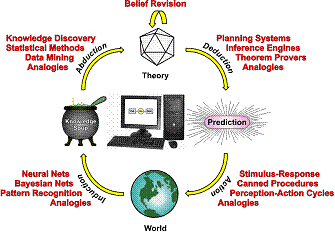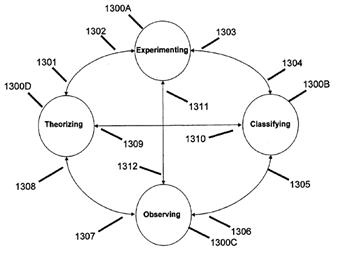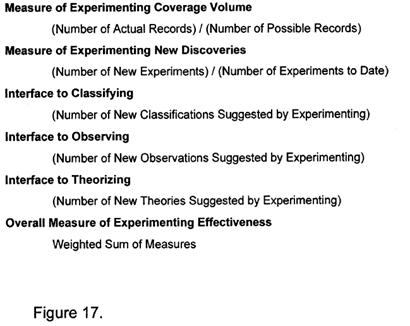Dear John,
My comments are below in black.
-Rich
Sincerely,
Rich Cooper
EnglishLogicKernel.com
Rich AT EnglishLogicKernel DOT com
9 4 9 \ 5 2 5 - 5 7 1 2
-----Original Message-----
From: ontolog-forum-bounces@xxxxxxxxxxxxxxxx
[mailto:ontolog-forum-bounces@xxxxxxxxxxxxxxxx] On Behalf Of John F Sowa
Sent: Tuesday, November 26, 2013 7:45 PM
To: ontolog-forum@xxxxxxxxxxxxxxxx
Subject: Re: [ontolog-forum] Biologically
inspired cognitive architecture (wasSemantic Dementia)
On 11/26/2013 10:37 PM, Rich Cooper wrote:
> The Peirce link is
broken:
>
>
http://www.jfsowa.com/pubs/goal5.pdf
Sorry. I put the
pubs in the pubs directory, and the slides
in the talks
directory. I usually check before I send a note.
Corrected version:
> To return to the
theme of cognitive architecture, see Peirce's cycle
> of pragmatism:
slide 32 of http://www.jfsowa.com/talks/goal5.pdf
Here is the picture from
slide 32:

I used a similar drawing
in my patent:

But instead of
attributing it to Peirce originally, I found references on the web to the “universal
discovery process” attributed to some old Greeks. Peirce may have
gotten it from old Greeks also, but it seems to well known to have been
originated only so recently as Peirce.
The
point is simply that every technology is developed using cut and try methods
until, after enough trial and error, you come up with an explanation of
observed phenomenon that is detailed enough to use in real life
applications.
In Figure 17, I defined
methods for establishing comparative values along the various axes so that
concepts could be compared. These are “meta” level ways of
estimating progress toward each axis goal.

Also note the similarities
to slides 37 & 38 of
http://www.jfsowa.com/talks/goal2.pdf
John
Yes, people seem to like the analogy of a virtuous
cycle of test and improve, much like modern programming starts with a purely
logical representation, and evolves under testing and customer review to settle
into a “good enough” fit to do the necessary job. Few such
projects get everything right.
-Rich


